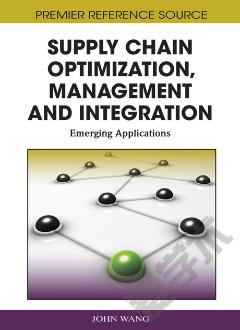Supply Chain Management: Applications for Manufacturing and Service Industries
Supply Chain Management (SCM) has been widely researched in numerous application domains in manufacturing and service industries during the last decades. There are several attempts made by researchers and practitioners to appropriately define SCM and its applications. This book entitled Supply Chain Management: Applications for Manufacturing and Service Industries is comprised of twelve chapters. Chapter One develops a mathematical model in a four layer supply chain including supplier, manufacturer, distributor and customers using the product life cycle factors to obtain the optimal number of products and the fulfillment of an activity in product life cycle. Chapter Two presents a recent and exhaustive review on important integrated supply chain management problems and the current research on integration between different supply chain management functions. Chapter Three illustrates a comprehensive multi criteria decision making (MCDM) methodology for the selection of a third party logistics service provider. Chapter Four explains the capabilities of Google Spreadsheet as a tool, using its tool inventory distribution management, risk pooling and transshipment at retailer levels for integrated operation of the supply chain. Chapter Five describes the agent-based modelling approach to simulate the interaction and negotiation behavior of palm oil supply chain (POSC) actors, which attempt to obtain highest added-value, but must consider overall supply chain profitability and sustainability. Chapter Six intends to signify the performance measurement practices in the industries and also presents the need of supply chain performance measurement in textile industry with a case study. In Chapter Seven, a generic method has been developed in order to assist and assess complex supply chain network design and analysis considering different types of uncertainty factors. Chapter Eight proposes a mathematical model to determine the optimal location for a warehouse. Several factors like locations of distributors, nature of demand etc. have been considered to formulate the optimization model, which has been solved using differential evolution. Chapter Nine is a study of sport-related location and layout strategies as they relate to the location of a firm (i.e., intermediate variables/functions, superior firm performance). Chapter Ten illustrates the various approaches to implement the green principles by different researchers. The main objective of the green supply chain management (GSCM) approach is to eliminate/ minimize the impact of the GHG emissions into the environment throughout the supply chain process. Chapter Eleven focuses on increasing the supply chain value by looking into the color, image and typography of water product in influencing customers’ intention to purchase. Finally, Chapter Twelve aims to investigate scenarios for the new setting of the Center of Sterilized Material (CSMs) health system of Rio de Janeiro, Brazil. To build and evaluate scenarios for the CSMs, an exploratory methodology based on gravity center approach for location of storage facilities and distribution of materials was adopted.
{{comment.content}}








 京公网安备 11010802027623号
京公网安备 11010802027623号